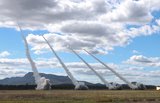Australia looks towards space with force restructure, investment and training
Australia is looking to improve its presence in space with a focus on communications and creating a dedicated segment of its defence forces committed to the domain.
Honeywell Aerospace’s Tactical Advanced Land Inertial Navigator (TALIN) will be produced in India by Tata Power's Strategic Engineering Division (SED) under a new licensing agreement between the two companies.
Producing TALIN in India will strengthen Honeywell’s relationship with Indian industry, and mark the first time inertial land navigation technology has been produced locally in the country. Honeywell will license the design, hardware and expertise to assemble, test and, in the future, build the production kits for TALIN to Tata Power SED.
TALIN is a highly accurate, shock-stabilised position and pointing inertial navigation system that enables vehicles and artillery to navigate very precisely - providing attitude and position awareness even where GPS satellite guidance is not available, to increase troop safety and maximise mission success.
Rahul Chaudhry, CEO, Tata Power SED, said: ‘Our strategic agreement with Honeywell supports Tata Power's SED commitment to the 'Make in India' initiative - a priority for India's new Government.
‘We are proud to have completed this technology sharing arrangement, which will offer the Indian armed forces a state-of-the-art inertial navigation technology, made in India and with local product support. This agreement sets the standard for locally produced defence technologies to sustain India's military growth and mission success over the coming years.’
The initial efforts will begin in 2015 for the TALIN 2000 with production and manufacturing of the system components expected by 2016. At this time the agreement will also be extended to cover Honeywell's TALIN 3000, 4000 and 5000 products, which offer varying capabilities to suit a wide range of operational requirements.

Australia is looking to improve its presence in space with a focus on communications and creating a dedicated segment of its defence forces committed to the domain.

The Portuguese company’s naval communications system is in service across more than a dozen countries. It has turned to its home nation for support in developing a new vehicle based C2 system.

The Vision4ce Deep Embedded Feature Tracking (DEFT) technology software is designed to process video and images by blending traditional computer vision with artificial intelligence (AI) algorithms to present actionable information from complex environments.

Persistent Systems has been cleared by National Security Agency (NSA) to transmit sensitive data on commercial networks. The devices are added to the NSA’s Commercial Solutions for Classified (CSfC) component list which also includes other companies’ products providing the same security.

The release of the UK’s Strategic Defence Review (SDR) has been long promised as mid-year. It is possible it could be as early as 2 June although the UK Ministry of Defence (MoD) continues to play its cards close to its chest.

Intelsat outlines how its multi-orbit SATCOM architecture is enhancing connectivity and resilience for special operations forces operating in degraded and contested environments.